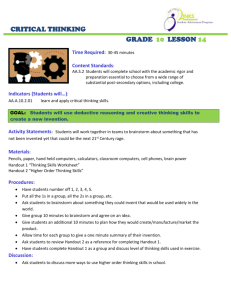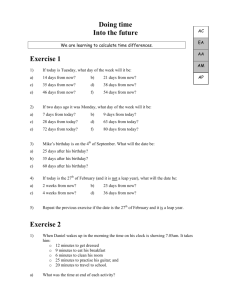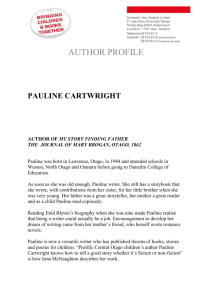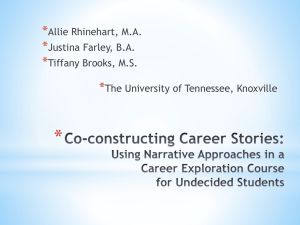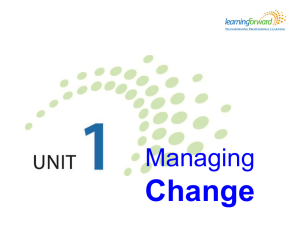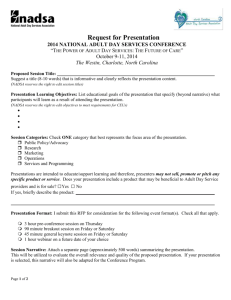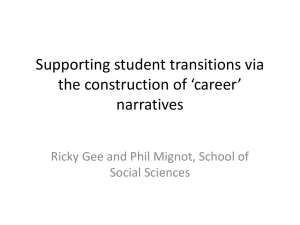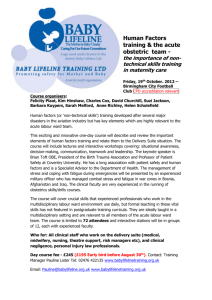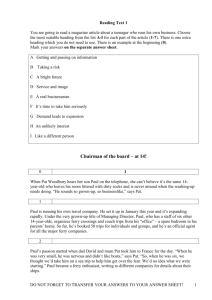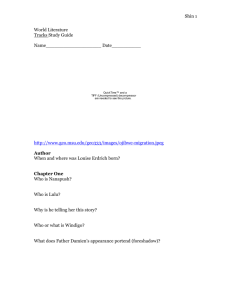Session Outline - Student Stories
advertisement
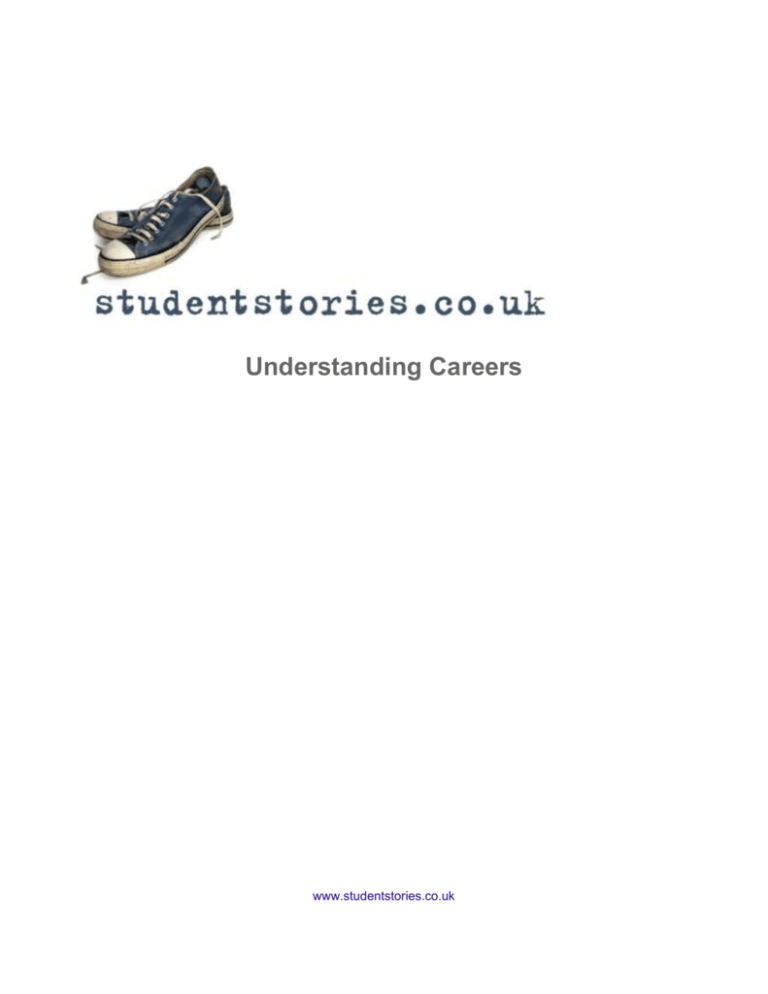
Understanding Careers www.studentstories.co.uk SESSION OUTLINE Understanding Careers Title: Approximate length: Two hours (if you keep moving or can be broken into two sessions part way through Activity Two) Aim: To develop students’ motivation to learn about career as a topic that is personal to them as individuals and as a subject containing concepts that can be studied objectively Learning Outcomes: By the end of the session, participants should: Know two different core ways that individuals learn about career Understand that different approaches lead to different outcomes Have evaluated two different ways of learning about career Have applied their learning to designing a programme of study of career for them and their peers Group: Second or final year undergraduates Room requirements: Internet access and audio speakers. Students should be able to work in small groups with a whole group plenary and have post it notes and large flip charts available (or one lap top per group connected to the internet and a Ning site accessible to share learning). Materials: Handouts (copies below) 1 Summarising career learning theory with further reading suggestions 2 Blank course template 3 Questions for taking on beyond the class www.studentstories.co.uk THE SESSION Introduction: Introduce the aims of the session; the content and style it will take. 10 minutes What you already know about careers: What do you think you know about career already? – brain storm ideas in pairs Whole group and Paired activity Feedback to whole group and facilitator gathers the ideas about how participants think they have learnt these things into two categories on a flip chart or white board. Ideas are likely to cover: Career exploration: such as reading and gathering information about choices and options, (eg: university prospectus), finding out about work and labour markets through research, contacts, reading vacancies. Learning through work experience, part time jobs, vacation work and volunteering. Career activities: making decisions, writing applications, being interviewed for jobs, going through selection processes, moving jobs, progressing in your career, career management Activity 1: 30 minutes Listening Reviewing career learning experiences of Student Stories participants to establish different ways of learning about career Listen closely to the words Pauline uses to describe her personal experience of learning about career. Pauline talks about her changing perceptions of career: http://www.studentstories.co.uk/audio/details.php?id=375 In this clip Pauline talks about her family and childhood experiences influencing her career thinking. Pauline talks about getting together new ideas for the future http://www.studentstories.co.uk/audio/details.php?id=374 This clip covers: the influence of the experiences friends have had; the living environment, Pauline’s emotions; learning from experience with a charity, trying to build a portfolio for freelance work. Dismissing career ideas (eg teaching) on superficial grounds Small group discussions, groups of 3, Questions for discussion: generating ideas of ways of learning about What has influenced Pauline’s learning about career to date? career How does she view her career now? What’s your reaction to how her career has developed so far? www.studentstories.co.uk Whole group plenary to gather ideas about ways to learn about career. In groups take one of the clips you have heard and describe the specific career learning experiences of the speaker. Make a list on flip chart about of the experiences you heard about. Then in another colour add your own ideas for things people do to learn more about career. Teacher’s note: you might find it helpful to prompt students with suggestions such as: people (parents, peers, friends, siblings); societal factors (no opportunities, no funding for further study, high costs of living); external influences (media representations) and internal factors (Pauline’s emotions, interests and talents). Is there any evidence of rational decision making? Display completed flip chart lists on wall for all to see. Activity 2: Evaluating different career learning experiences 35 minutes Handout 1: ‘Approaches to Career Learning’. Talk students through this and ask students to annotate their copy. Compare and contrast the two approaches fairly swiftly using examples from Pauline’s clips. (about 15 mins) Handout 1 Applying learning theory to ideas Ask participants to take one of Pauline’s clips and review her story in light of the two theories presented. Small group discussion, evaluating ideas Some questions to prompt the groups’ ideas: Social Learning Theory To what extent does this approach involve learning through experiences? What emotions does Pauline reveal? What does Pauline believe about herself? What other factors have influenced her decisions to date? What generalizations does she make about herself and the world around her? To what extent is this approach tacit or explicit? Narrative Technique How are Pauline’s preoccupations revealed through the words she is using? How can you analyse her experience of her career through the story she tells? How comprehensive is the participants’ understanding of the options open to them? What patterns of experience can you identify? Is there a place for critical thinking or rational decision making in this process? www.studentstories.co.uk Ask each group to evaluate their answers by listing some of the pros and cons they can think of for each item Facilitator to summarise the findings and encourage further thought about the handout. Activity 3: Imagine designing a careers course for your peers 30 minutes Review the session so far summarising career learning experiences and the pros and cons of each. Applying ideas in practice Small groups using concept mapping techniques Handout 2 In groups of three, write down all the topics that come to mind now about learning about career on individual post it notes. Form them into sensible clusters based around similar learning outcomes or activities. Stick the clusters of post its on flip chart paper and add words from the two theories you have studied to describe the different clusters. Add your ideas for increasing the learning from each of these activities. For groups who finish early: consider ways of delivering these sessions to undergraduate students and if there is time use Handout Two to write up the course on a blank Course Template. Display flip charts on walls and review each others’ sheets Conclusions: 15 minutes Play another Student Stories Clip to sum up some ideas about learning about career. For example, Natasha talking about thinking about her future http://www.studentstories.co.uk/audio/details.php?id=125 Everyone learns about career differently and uses different approaches. You now know and have evaluated a range of ways of learning about career. You have been introduced to two approaches: narrative and social learning. You know some of the types of topics that can be included in career learning. Handout 3 To increase your own understanding of career now, think about how you might apply concepts from this session to your current situation. Make a list of three things you want to remember from today and any actions you have in mind to pursue now. Identify help that is available to you to pursue these actions. www.studentstories.co.uk Closing questions and evaluation Final thought: Imagine what you might be saying in the future on a Student Stories clip! Resources: Handouts 1 Career Learning Theory (with further reading) Handout 1 Activity 2 2 Blank (generalised) course template but for authenticity you might want to use a real one from your institution. Two career learning theories This short summary introduces you to some of the ideas underpinning two different approaches to learning about careers. The words in bold give suggestions for things to listen out for in the Student Stories clips. Social Learning Theory 1 2 3 4 5 6 7 8 9 People repeat behaviours that are rewarded and do not repeat behaviours that are punished. They learn from the consequences of their behaviour (this is known as instrumental learning) People’s learning is affected by their emotions and they will be drawn back to previous experiences or events and places that affected them positively and will avoid those that made them feel unhappy (this is known as associative learning) People’s beliefs about their own skills and aptitudes will influence their behaviour, whether or not those beliefs are accurate Current interests are an indicator of people’s previous experiences People’s decisions are influenced by their unique combination of genetic factors and environmental influences leading to abilities such as artistic talent, sporting ability or intelligence External factors such as availability of opportunities, legislation and social policy will impact on an individual’s decisions People often make generalisations about themselves based on the accumulation of years of experiences, for example, ‘I’m a people person’ and this might be more or less accurate People often make generalisations about the world around them and again this might be accurate or not John Krumboltz is a key figure writing about this theory Reference: John D. Krumboltz, Anita M. Mitchell and G. Brian Jones, A Social Learning Theory of Career Selection. The Counseling Psychologist 1976; 6; 71 Narrative approaches www.studentstories.co.uk 1 2 3 Careers can be presented as stories or dramas which have a coherent form The telling of the story reveals the pre-occupations of the teller A person can take the role of a character in the story and their roles are relatively stable so that their behaviour can be anticipated 4 Experiences of career can be described and analysed through the narrative 5 The tensions caused by the differences between the beginning and the ending of the story are of interest and relevant to the developing career 6 Experiences are more relevant if considered as groups of experiences forming patterns rather than as individual episodes 7 The role is both subjective ( as it allows the self to be examined) and objective (as it is played out in a social drama) 8 Narratives are made up of small stories and are fragmented and provisional representing the experience of contemporary careers 9 Narratives provide a sound basis for new actions 10 Laurie Cochran and Mark Savickas are key figures in this area References: Cochran, L. (1997). Career Counselling: A Narrative Approach. London: Sage. Savickas, M.L. (1996). A Framework for Linking Career Theory and Practice. In M.L. Savickas and W.B. Walsh (Eds), Handbook of Career Counselling Theory and Practice. Palo Alto, California: Davies-Black. Handout Two Simplified Blank Course Template Activity 3 Title of course: Aims: Structure (number of sessions, how long etc): Learning Outcomes (include knowledge and skills): Teaching and learning methods: www.studentstories.co.uk Resources required: Assessment methods: Handout 3 Questions to take away from today Three things to remember from today: Three actions to take to pursue to help you learn about your career: Sources of help to support you in achieving this: www.studentstories.co.uk Further reading: Amundsen, C., Weston, C. and McAlpine, L. (2008). Concept mapping to support university academics’ analysis of course content. Studies in Higher Education. 33: 6 (633- 652). John D. Krumboltz, Anita M. Mitchell and G. Brian Jones, A Social Learning Theory of Career Selection. The Counseling Psychologist. 1976; 6; 71 McCash, P.( 2010) Using concept mapping to develop a curriculum for career studies. NICEC Journa.l 23: 25 – 32 Cochran, L. (1997). Career Counselling: A Narrative Approach. London: Sage. Savickas, M.L. (1996). A Framework for Linking Career Theory and Practice. In M.L. Savickas and W.B. Walsh (Eds), Handbook of Career Counselling Theory and Practice. Palo Alto, California: Davies-Black. Follow-on session: Students start to design the individual modules to deliver to each other www.studentstories.co.uk


